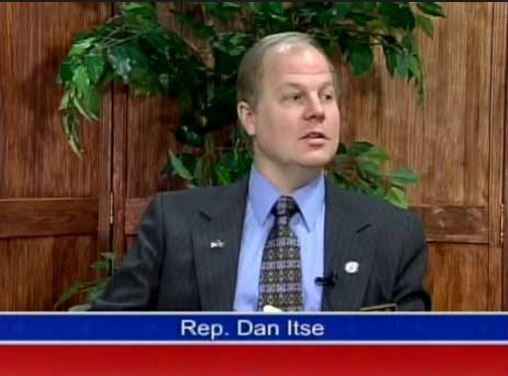The Republican perspective.
By Rep. Dan Itse, R-Fremont
View from Inside
June 22 was the last day of Session. The last days of Session are consumed with the acceptance or rejection of Committee of Conference Reports.
Bills originate in either the House of Representatives or the Senate where they are given a public hearing in the Committee with policy jurisdiction, and possibly sent to a Subcommittee for further deliberation.
The Committee (and possibly Subcommittee) make their recommendation of Ought-to-Pass (OTP), Ought-to-Pass with Amendment (OTPA), or Inexpedient-to-Legislate (ITL). A Committee can also retain a Bill for further study (or interim study in the second year).
Retained Bills are acted on in the first Session Day of the second year. If a Bill passes the Chamber it originated in, then it is passed over to the other Chamber where it undergoes the same process. If the second Chamber agrees with the first, then the Bill goes on to the Governor.
If the second Chamber amends the Bill, then the first chamber has three choices: concur (agree) with the amendment; non-concur with the amendment (and the Bill dies); non-concur with the amendment and request a Committee of Conference to hash out the differences. If there is a Committee of Conference, both Chambers then have to agree with the Committee of Conference before the Bill goes on to the Governor.

Rep. Dan Itse, R-Fremont
We spend the last two or three Session days principally voting on Committee of Conference Reports. Two weeks ago we had a Session Day where we dealt with all the remaining Bills that did not require a Committee of Conference, otherwise the number of Committees of Conference would have increased dramatically due to deadlines.
The only great controversy I recall was SB66 making death of a wanted unborn child by murder or assault of the mother a separate murder. The Democrats opposed it of course, and there was a concern from conservatives that we should not be effectively putting Roe versus Wade into Statute. In the end, I supported SB66 because the federal judiciary has required the specific exemption of abortion from the Statute. Personally, I do not believe it should be included. In what universe can an act contracted by the mother, be construed as an assault upon the mother. But, half a loaf is better than none.
Last week we had the last Session Day (per the Constitution we have to be done by June 30). We had four controversial Bills: SB66, discussed above; SB144, to which the budget (HB1) had been amended; SB 517, to which the trailer bill (HB2) had been amended; and SB191, to which full day kindergarten funded by Keno (or as it was nicknamed, Kenogarten).
SB66 had already been approved by both chambers, and was already on the way to the Governor’s desk, when it was discovered that the verbiage potentially allowed a pregnant woman to contract murder without consequence. This was a consequence of the abortion exemption. The correction to the language was executed via an enrolled Bill Amendment. Normally, enrolled Bill Amendments are used for minor corrections such as grammatical errors.
The Clerk of the House (Representatives or Senate) finds two members of the chamber wandering the State House, one becomes the Presiding Officer (Speaker or President) the other becomes the body. The Presiding Officer reads the title of the Bill and Amendment and the question of adoption, and the member votes (unanimously) to adopt the Amendment. There are no specific rules for enrolled Bill Amendments, the simple test is do both bodies agree.
It was judged to be acceptable to correct the flaw in SB66 this way because it brought the Bill into accordance with what both chambers thought they had done. However, because the change was more than a simple grammatical correction, and therefore, the enrolled Bill Amendment was brought back to both full chambers for approval.
If you remember my previous article on the budget, HB1 (the budget) and HB2 (the trailer bill that changes Statutes to enable the budget) failed. Normally, they would have gone onto Senate for further deliberation, and potential amendment. Constitutionally (Part 2, Article 18-a), they are required to originate in the House of Representatives.
Therefore, the Senate began work on both bills by determining to amend the content of Bills to two existing House Bills still their possession. Knowing that the Bills had not passed the House due to not being accepted by the Democrats and conservative Republicans for opposite reasons, the Senate began with HB1 and HB2 as a starting point, and trimmed a little further. The Committee of Conference trimmed them a little further still.
I still could not bring myself to vote for HB144 (HB1), though I did support HB517 (HB2). The budget had two major flaws that I could not abide by.
First and foremost, it increases more than I believe it should. The 2018/2019 appropriations increase 6% over the 2016/2017 appropriations when the inflation rate is at most 4%. I thought about my neighbor, who has been unable to find a new position for a long time, and another neighbor who was laid off for about nine months. As I moved around the community, I asked cashiers and mechanics what they thought, and they said, “no.” I spoke to my neighbor after the fact, and he (a Republican) said, “no.” This is money that in one way or another we are taking out of the New Hampshire economy.
To my way of thinking, when so many of my constituents are having difficulty paying their bills, or are on fixed incomes, we have no business increasing the spending of government faster than inflation. In all fairness, the position of leadership is that the budget increases only 4.2% compared to the 2017 actual spending. However, the 2017 actual spending includes appropriations outside the budget.
To be consistent, we would have to include future appropriations outside the budget (which we don’t know). Comparing the 2018/2019 budget to the 2017 actual spending would only be valid if there a commitment to no appropriations outside of the budget, or corresponding cuts to the budget appropriations for every appropriation outside the budget. The appropriations outside the last budget totaled to $144M. Already, we have moved full day kindergarten outside the budget which will have a cost between $0 and $29M depending on how much Keno generates and how much full-day kindergarten costs.
The second flaw, is pretending that we do not know that we will accept the Medicaid and Special Education reimbursements to the schools this summer, with the full intention to accept them this summer via the Joint Fiscal Committee. This is quite simply a lie to make the budget appear lower (on the federal funding side). I know I have voted for budgets with this chicanery in the past, but I didn’t know it. This time it was told to me explicitly and with some camaraderie, “This will put the budget under $12B, and then we’ll just bring it in through the Fiscal Committee, you know how we do things up here.” I do now, and I won’t endorse it. I don’t lie to my constituents.
In truth, neither did I vote no. The risk if the budget failed is that it would increase in order to obtain support from the Democrats needed to pass it. Neither option was acceptable. As I told someone on the way to Concord on my Ham Radio (I got my license last fall), he had just told me he was going to Hampton Beach for the day and a lobster dinner, the only things on my menu today were a manure sandwich and the poo poo platter. For the second, time in 17 years, I walked on a vote. I could not put my imprimatur on the budget, nor could I risk a worse budget.
The last item on the list was SB129, full-day kindergarten. There is no evidence that full-day kindergarten or Head Start provide any lasting advantage; any academic advantages typically disappear by about 5th grade. That means full-day kindergarten is as much a daycare program as it is an education program, which in turn means that parent who choose to live on one income so that they can have a full-time parent are subsidizing those who choose to have two incomes.
The hook for full-day kindergarten was that it will be paid for by Keno. Keno is expected to generate about $14M (maybe). However, the cost of full-day kindergarten is somewhere between $14M and $29M depending on how many towns (currently about 75%) implement it, and how many parents utilize it. So full-day kindergarten will add between $0 and $29M to State spending.
Now we are done for the Session, and the work between the Sessions continues. The Joint Fiscal Committee will meet to accept money and transfer line items. The Retained Bills (remember them from the first paragraph) will be worked on beginning in late Summer. The Committees must make their recommendations by November and the Chambers will vote on them the first Session Day in January. I am Chairman of the Subcommittee regarding HB521 and SB71 which revise our alimony Statutes.
All in all, though I have not been to the well as frequently as usual (members of Leadership can’t speak against Committee Reports), I have been more successful than in past Sessions at succeeding with legislation. One Bill that I sponsored and four more Bills that I co-sponsored have become law; all of them act to reduce the power of, or restrict the actions of government. Another eight Bills that I sponsored or co-sponsored have been retained in Committee in the House; another eight were Laid Upon the Table such that they can be reintroduced next session (two expressly for that purpose); and one was referred in the Senate (the same as retained).
God Bless the Great State of New Hampshire
Dan Itse
Hon. Daniel C. Itse
New Hampshire State Representative,
Rockingham County, District 10, Fremont
Government cannot create wealth; individuals create wealth, and governments consume it.





